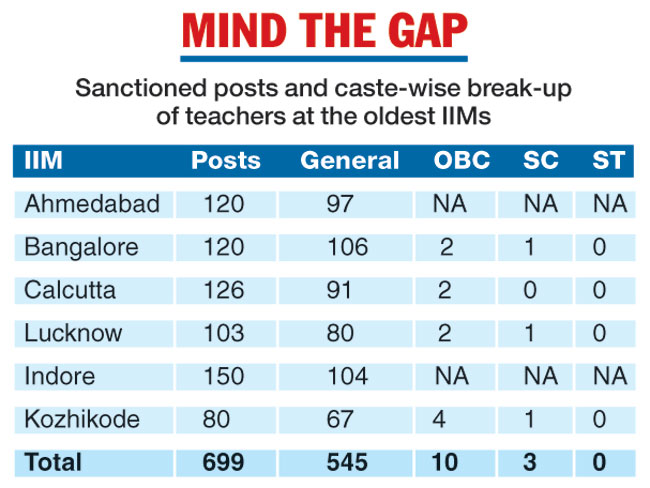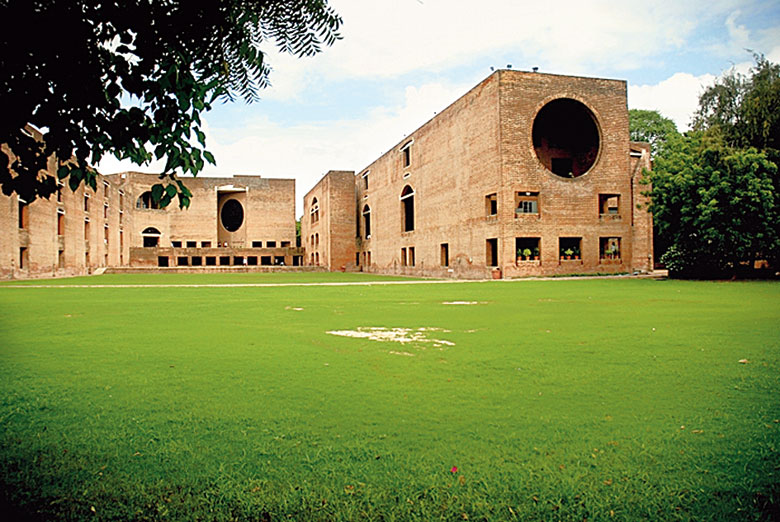
The Telegraph
The Indian Institutes of Management are likely to go on denying reservation in faculty recruitment despite the Centre promulgating an ordinance on Thursday paving the way for the unambiguous implementation of teacher quotas.
Although the ordinance is binding on all central educational institutions, including the Indian Institutes of Technology and the IIMs, the B-schools are unlikely to follow the norms, the director of an IIM and a senior teacher at another told this newspaper.
According to the ordinance, each central educational institution must reserve 15 per cent of its teaching posts for the Scheduled Castes, 7.5 per cent for the Scheduled Tribes, and 27 per cent for the OBCs, with the quotas being implemented institution-wise rather than department-wise.
The IIMs have been denying reservation in teacher recruitment since their inception. Since 1975, they have been citing a letter issued that year by the Union government’s department of personnel and training that said scientific and technical posts would be exempt from reservation.
Candidates from the disadvantaged sections, therefore, have to secure faculty positions at the IIMs competing under the general category.
According to data compiled by the human resource development ministry, 344 of the 429 sanctioned faculty posts at four of the older IIMs are occupied by teachers from the general category. There are 10 OBCs, three Dalits and none from the tribal communities (72 posts are vacant).
The other two among the six older IIMs did not supply data about teachers from the disadvantaged sections, saying they do not maintain such records.
“Management is technical education. The IIMs enjoy exemption from reservation because the faculty posts are technical posts,” said the IIM director, who did not want to be quoted.
“Unless the government withdraws its earlier order, the IIMs should not be expected to follow the norms laid down in the ordinance.”
IIM Ahmedabad had officially adopted the 1975 order while the other IIMs have taken advantage of it without adopting it.
The IITs too exempted themselves from teacher quotas till 2008. Then the human resource development ministry directed them to implement reservation for assistant professors in science and technology subjects and for all teachers — including associate professors and professors -— in streams such as the humanities and management.
But the ministry has not issued any binding orders — only advisories — to the IIMs to adopt teacher quotas. Nor does the recently passed IIM Act force the B-schools to do so.
A senior teacher from IIM Calcutta said the premier B-schools had started implementing student quotas in their PhD programmes, which they never did before. This, he argued, would create a “talent pool” of PhD degree holders from the disadvantaged sections who would be well suited to secure IIM teaching posts — under the general category — if they wanted.
P.S. Krishnan, a former secretary to the Union government and a votary of social justice, said there’s no reason for the exemption given to the IIMs to continue. “The government has to withdraw the order of 1975,” he said.
N. Sukumar, an Ambedkarite scholar and member of the Joint Action Committee that spearheaded the movement for institution-wise implementation of teacher quotas, said the movement would now battle the exemption enjoyed by the IIMs.
“The IIMs do not implement teacher reservation at all. The IITs do so only for the posts of assistant professor in technology subjects. Some institutions issue ‘rolling’ (informal) advertisements that do not specify the number of total posts available or the reserved posts. The next level of fight will be against these anomalies,” Sukumar said.
A HRD ministry official said the government had not yet examined the matter of the IIMs’ disregard of teacher quotas. “It has to be examined,” he said.











